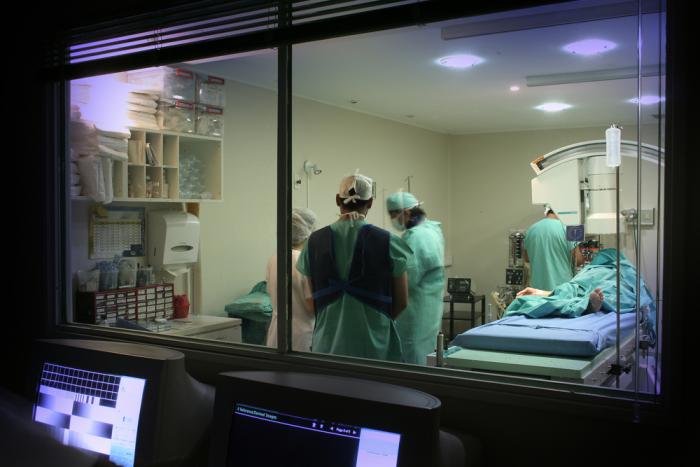- Home
- Play & Learn Home
- Online Enrichment
- Experience Modern Israel
- Israel It's Complicated
- Jewish and Me
- Jewish Holidays Jewish Values
- Jewish Values in Genesis and Jewish Values in Exodus
- Min Ha’aretz
- Our Place in the Universe
- Simply Seder
- The Prophets: Speaking Out for Justice
- Making T'filah Meaningful
- Make, Create, Celebrate
- Yom Haatzmaut Resources
- Hebrew Apps
- About The OLC
- What is the OLC?
- Introduction
- Get Started
- Resources
- OLC Content
- Parent Materials
- See My OLC Classes
- Store
Mending Broken Hearts
In a clinic in Addis Ababa, Ethiopia, dozens of children and their parents stand in line, their eyes reflecting despair and a glimmer of hope. All the children suffer from heart defects; all require lifesaving surgery unavailable in this poor Third World country. Among them is Estub, 4, a beautiful but frail girl born with a hole between the chambers of her small heart. Left untreated, her condition will eventually claim her young life. Her only chance for survival lies with a team of Israeli doctors from the Save A Child's Heart (SACH) organization. One by one, the Israeli cardiologists evaluate each child, and to her parents' delight, Estub is chosen.
A child in Israel can go anywhere for treatment," explains Dr. Akiva Tamir, one of the physicians who traveled to Addis Ababa, "but these children don't have anywhere else to go. If we don't treat them, they will die."
Since 1995, Save A Child's Heart has been offering free pediatric heart surgery and followup care to children from Third World and developing countries, with an astounding success rate of 96 percent. To date, more than 1,600 children from 28 different countries have been brought to Wolfson Medical Center in Holon, Israel for lifesaving cardiac surgery. The children hail from diverse places such as China, Iraq, Rwanda, and the Palestinian territories.
"The bottom line," explains Simon Fisher, executive director of SACH, "is that we believe that a child is a child, created b'tzelem Elokim [in God's image]. Each child deserves the best treatment we can offer, regardless of race, color, religion, or nationality."
Estub's family cannot afford to travel with her, so she embarks on her journey accompanied by medical staff and several other children and their families. Throughout the trip, she exhibits a quiet maturity; her parents have explained why she is traveling so far from home, and her mother has instructed her to be brave. Estub, heeding her mother's words, does not cry. This is her only chance at life.
Saving lives, though, is expensive-$10,000 for each operation-and SACH depends on volunteer medical staff and donations to continue its important work
Ultimately, SACH seeks to educate medical staff in developing countries, enabling each nation to provide treatment on its own. Israeli physicians travel overseas to perform surgeries with local personnel, and foreign doctors and nurses travel to Israel, where Israeli medical staff train them in pediatric cardiology. Fisher describes a scene he witnessed at Wolfson: An Israeli surgeon of Iraqi origin, a Chinese surgeon, and a Palestinian anesthesiologist were performing open-heart surgery on a Palestinian child. Later, that child was cared for in the pediatric intensive care unit by Israeli staff and a pediatrician from Moldova
"We have knowledge," Fisher notes, "and we need to share that knowledge with others. We believe that every medical society should advance as much as possible to be able to treat its own."
For several days, Estub resides at the Save A Child's Heart hostel, where she is cared for by an Ethiopian volunteer. There she celebrates her fifth birthday with the staff and other children waiting for surgery. Soon Estub's turn arrives, and draped in a hospital gown, she is carried by a nurse to the operating room. For the first time, Estub begins to cry. The doctors reassure her: Everything will be all right.
The impact of SACH reaches far beyond children's health. Ultimately, says professor Arie Schachner, international vice president of SACH, the organization accomplishes "more than 1,000 diplomats [would], working full time." He recalls a mother from the Palestinian territories who exhibited a lot of hate and prejudice. "But now she knows our humanitarian mission, salutes it, and spreads the word," he says.
While Fisher stresse that the organization has no political agenda, he remarks that SACH's work has ramifications for Israel's relationships with other countries. "SACH has this tremendous positive energy which builds bridges between people," he notes. "Hopefully it goes beyond that, and will build bridges between nations."
Hours later, the surgeons finish operating on Estub. A doctor places a call to her father, relating good news: The surgery was successful. Estub can look forward to a long, healthy life. When she recovers, her frailness will be gone, she will be able to run and laugh, and she will return to her family in Ethiopia. Perhaps one day she will choose to become a cardiac surgeon, and will be able to save lives in her native country.
0


